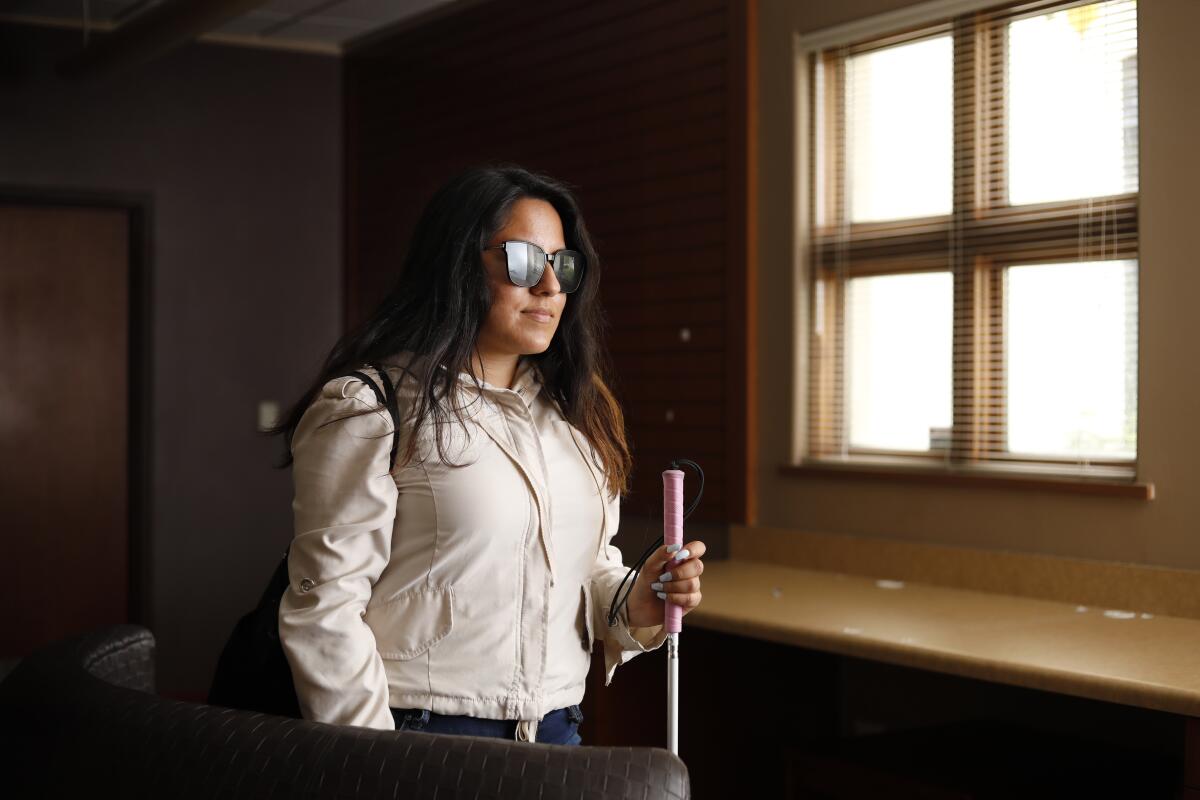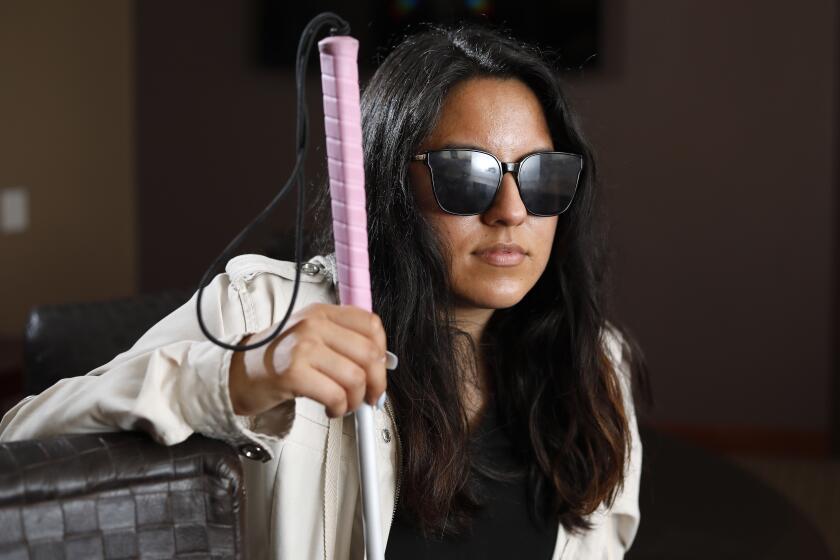San Diego County will pay $4.35 million to woman who gouged out her eyes in jail

- Share via
SAN DIEGO — A young woman who blinded herself in a jail cell in 2019 will receive $4.35 million from San Diego County, the latest in a string of multimillion-dollar legal settlements the county has paid out over deaths and serious injuries in its jails.
In March 2020, Tanya Suarez sued the county, arguing that staff at the Las Colinas women’s jail in Santee had failed to protect her from harming herself. Nearly a year earlier, Suarez, then 23, was under the influence of methamphetamine and hallucinating when she gouged out both of her eyes, believing that if she didn’t, jailers would torture her and her family.
In her lawsuit, Suarez argued that jail staff had multiple opportunities to intervene to prevent her from harming herself. She told the San Diego Union-Tribune that a simple conversation could have prevented her injury.
Tanya Suarez was high on meth and paranoid, her lawsuit says. She wishes jail staff had not isolated her during her crisis.
Suarez had first started clawing at her eyes while waiting to be fingerprinted. Instead of placing her in a restraint chair or closely monitoring her until she was sober, staff put her in a cell by herself.
According to her lawsuit, a deputy “admitted that she watched Tanya try to remove her right eyeball for at least 10 seconds. She then witnessed the right eyeball fall to the floor and still failed to intervene by banging on the door or going inside the cell.”
Surveillance video obtained by Suarez’s attorney, Danielle Pena, shows a different deputy appearing to film Suarez through the cell window with a digital camera; the deputy and the camera are the last things Suarez remembers seeing.
According to the suit, surveillance footage shows the deputy recording her for 33 seconds, “making violent gestures with her fingers near her eyes, indicating she could and would gouge out her eyes.”
The deputy did nothing to intervene, Pena said.
Pena requested a copy of the video, but county lawyers said the deputy only took four photographs of Suarez and did not film her.
Pena said she asked to have the camera and the photos examined by a forensics expert.
The expert, jointly hired by Pena and the county, concluded that the camera Pena was provided was not the same camera that had been used to take the photos.
Pena said she received a settlement offer from the county hours after both parties received the expert’s report.
“My allegation is they could not turn over the actual phone because it was either destroyed or because it would show that a video was taken and deleted,” she said.
“I think it’s safe to assume it’s protocol to document people in the safety cell,” Pena added. “But taking a video of her while she’s actively hurting herself? That would not be within policy.”
Department policy on safety-cell placement calls for deputies to “be cognizant of the incarcerated person’s physical condition” and says health staff “must be notified immediately if the individual exhibits any signs of medical distress, including agitated psychosis and/or agitated/excited delirium.”
Inmate’s lawsuit alleges indifference, negligence, when she was under influence of drugs
Suarez told the San Diego Union-Tribune that she had turned to meth to cope with depression.
She was taken into custody on May 5, 2019, after accompanying her boyfriend to a San Ysidro motel room where she used the drug. San Diego police found her wandering near the hotel and arrested her.
Jail intake paperwork obtained by her attorneys notes that she was “acting bizarrely and responding to internal stimuli.” After she started clawing at her eyes, deputies cut off her clothes and her acrylic nails, leaving cracked, jagged edges. She was then placed alone in a safety cell, which is normally for people who are actively suicidal.
Internal documents provided to Pena earlier this year revealed that deputy Natalie Crist, who had been involved in processing Suarez, had recommended placing her in a restraint chair so she could not harm herself.
But the jail’s watch commander, Charlise Wilson, rejected that recommendation, then ordered a sergeant to remove from Crist’s report any mention that she had rejected it.
Sheriff’s supervisor refused deputy’s request to restrain woman who later blinded herself
When Crist realized her report had been altered, she told a department captain, triggering the internal affairs investigation.
When asked by an investigator why she had ordered changes to Crist’s report, Wilson initially said she “did not want to get into further trouble because she was on probation at the time,” according to a motion filed by Pena in August that quoted from the report.
Wilson later changed her story, telling investigators she assumed the report was about Suarez biting a deputy, so the information about the restraint chair was not relevant.
According to Pena’s motion, Wilson was cleared by the investigation, but the sergeant who amended Crist’s report was found by investigators to have been dishonest.
Pena said Wilson could have ordered that Suarez remain handcuffed or be continuously monitored until she was no longer under the influence.
Including Suarez’s settlement, the county will have paid out $27.1 million over the last five years to settle cases involving deaths and serious injuries in jail custody.
Suarez told the Union-Tribune that the money will help her work toward living more independently.
She said she is still getting used to performing everyday tasks on her own and is trying as much as she can to help her mother with chores and taking care of her two younger siblings. She would like to start her own business someday, she said, and has an interest in aromatherapy.
A Sheriff’s Department spokesperson said the department was grateful the case had been settled.
“But we know this cannot erase the pain and trauma from this incident or the life-changing aftermath,” Lt. Amber Baggs wrote in an email. “The San Diego Sheriff’s Department sends our sincere sympathy to Ms. Suarez, her family and all who were affected by this horrific and shocking incident.”
Pena said she hopes to see more accountability when recommendations that could keep an incarcerated person safe from harm are ignored.
“Cpl. Crist is someone who cared and tried to do everything she could for Tanya,” Pena said. “These are the kind of people we need in our jails.”
More to Read
Sign up for Essential California
The most important California stories and recommendations in your inbox every morning.
You may occasionally receive promotional content from the Los Angeles Times.













